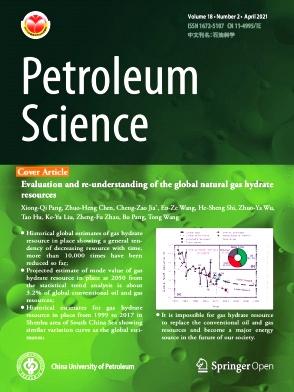利用IADR-Gibbs算法对VTI介质流体及各向异性参数进行贝叶斯AVO反演
IF 6.1
1区 工程技术
Q2 ENERGY & FUELS
引用次数: 0
摘要
流体识别和各向异性参数表征是页岩储层勘探开发的关键。然而,各向异性反射系数方程是基于介质具有垂直对称轴(VTI)的横向各向同性假设,涉及许多需要反演的参数。这种复杂性降低了AVO反演结果的稳定性,影响了AVO反演结果的精度。本文提出了一种包含流体项和Thomsen各向异性参数的新型各向异性方程,降低了方程的维数,提高了方程的稳定性。此外,传统的Markov Chain Monte Carlo (MCMC)反演算法对随机样本的拒绝率较高,且依赖于已知的参数分布(如高斯分布),限制了算法的收敛性和样本的随机性。为了解决AVO反演的局限性,评估AVO反演的不确定性,提出了独立自适应延迟抑制(IADR)算法与Gibbs采样算法相结合的IADR-Gibbs算法。该算法以贝叶斯理论为基础,引入支点构造非参数分布的建议分布,并根据延迟拒绝策略重新选择被拒绝的样本。然后将被拒绝的样本添加到支撑点,以自适应地更新提案分布函数。方程重写法和IADR-Gibbs算法提高了AVO反演的精度和鲁棒性。通过综合采集试验和实际数据应用,验证了该方法的有效性和适用性。本文章由计算机程序翻译,如有差异,请以英文原文为准。
Bayesian AVO inversion of fluid and anisotropy parameters in VTI media using IADR-Gibbs algorithm
Fluid identification and anisotropic parameters characterization are crucial for shale reservoir exploration and development. However, the anisotropic reflection coefficient equation, based on the transverse isotropy with a vertical axis of symmetry (VTI) medium assumption, involves numerous parameters to be inverted. This complexity reduces its stability and impacts the accuracy of seismic amplitude variation with offset (AVO) inversion results. In this study, a novel anisotropic equation that includes the fluid term and Thomsen anisotropic parameters is rewritten, which reduces the equation's dimensionality and increases its stability. Additionally, the traditional Markov Chain Monte Carlo (MCMC) inversion algorithm exhibits a high rejection rate for random samples and relies on known parameter distributions such as the Gaussian distribution, limiting the algorithm's convergence and sample randomness. To address these limitations and evaluate the uncertainty of AVO inversion, the IADR-Gibbs algorithm is proposed, which incorporates the Independent Adaptive Delayed Rejection (IADR) algorithm with the Gibbs sampling algorithm. Grounded in Bayesian theory, the new algorithm introduces support points to construct a proposal distribution of non-parametric distribution and reselects the rejected samples according to the Delayed Rejection (DR) strategy. Rejected samples are then added to the support points to update the proposal distribution function adaptively. The equation rewriting method and the IADR-Gibbs algorithm improve the accuracy and robustness of AVO inversion. The effectiveness and applicability of the proposed method are validated through synthetic gather tests and practical data applications.
求助全文
通过发布文献求助,成功后即可免费获取论文全文。
去求助
来源期刊

Petroleum Science
地学-地球化学与地球物理
CiteScore
7.70
自引率
16.10%
发文量
311
审稿时长
63 days
期刊介绍:
Petroleum Science is the only English journal in China on petroleum science and technology that is intended for professionals engaged in petroleum science research and technical applications all over the world, as well as the managerial personnel of oil companies. It covers petroleum geology, petroleum geophysics, petroleum engineering, petrochemistry & chemical engineering, petroleum mechanics, and economic management. It aims to introduce the latest results in oil industry research in China, promote cooperation in petroleum science research between China and the rest of the world, and build a bridge for scientific communication between China and the world.
 求助内容:
求助内容: 应助结果提醒方式:
应助结果提醒方式:


